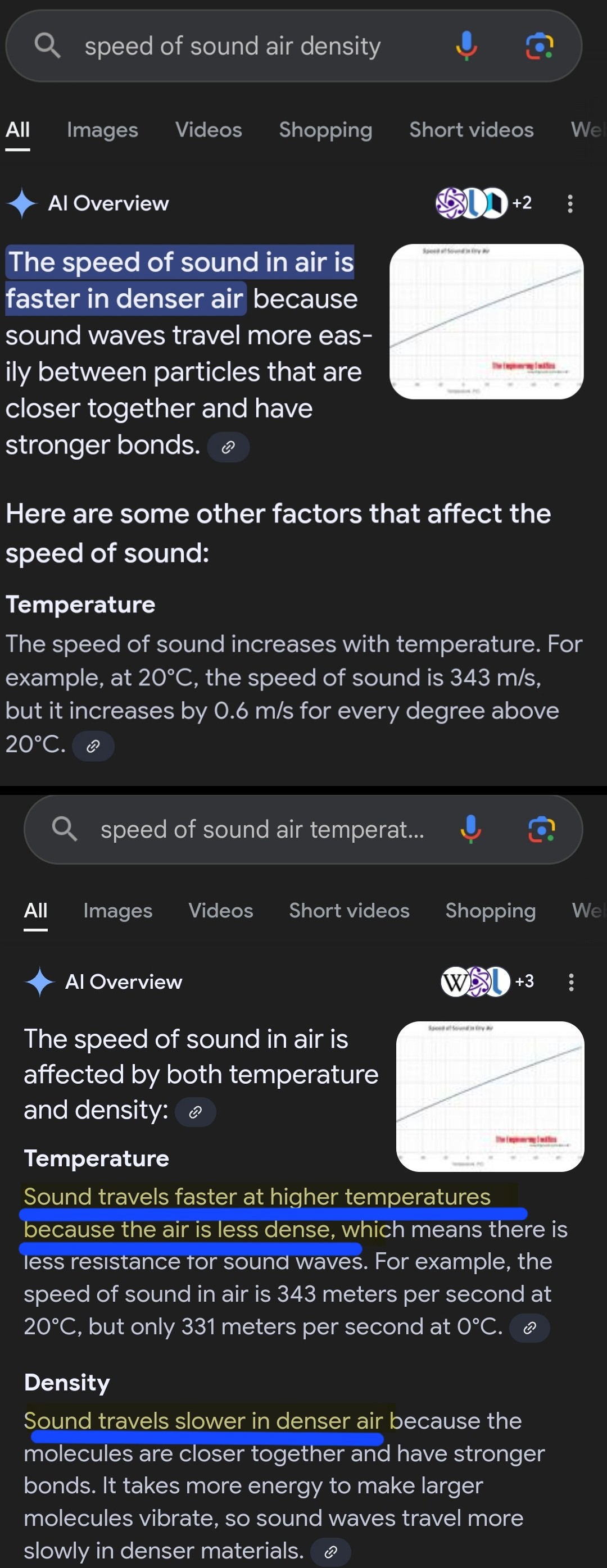this post was submitted on 19 Dec 2024
201 points (98.6% liked)
Artificial Ignorance
103 readers
1 users here now
In this community we share the best (worst?) examples of Artificial "Intelligence" being completely moronic. Did an AI give you the totally wrong answer and then in the same sentence contradict itself? Did it misquote a Wikipedia article with the exact wrong answer? Maybe it completely misinterpreted your image prompt and "created" something ridiculous.
Post your screenshots here, ideally showing the prompt and the epic stupidity.
Let's keep it light and fun, and embarrass the hell out of these Artificial Ignoramuses.
All languages welcome, but an English explanation would be appreciated to keep a common method of communication. Maybe use AI to do the translation for you...
founded 2 months ago
MODERATORS
you are viewing a single comment's thread
view the rest of the comments
view the rest of the comments

This seems like a difficult thing to get right. To me it would intuitively seem like air transmits sound easier than e.g. water or steel since there is less to dampen the waves. But that's just wrong. You shouldn't trust intuition when it comes to physics, even if you are a physicist.
I’m not a physicist and I’m taking a stab without looking it up.
Is there an index of refraction or something so that if you transmit through air than water than air you would think that sound is “dampened”?
I’m having a hard time with just an object though. Is the speed of sound a constant? I’ve never heard it defined with respect to to air
I am a physicist, for context. Please just use a table for the values in air.
What do you mean with index of refraction? For light this refers to the speed of light in the medium. In this sense you can define a index of refraction for sound, but would you want to? It has very little to do with dampening (dampening is usually wave length depended so they are usually proportional).
The speed of sound in air is ca. 300m/s, in water 1500m/s. so their relative index of refraction are 5. This implies rather difficult transition of sounds between medias since most sounds are going to be reflected. Refer to frustrated reflection.
The physics of why denser air is claimed to have a slower speed of sound is not clear to me, but I suspect there is some bullshit going on since the question is not sensical. You can't double the density of a gas without changing other parameters like Temperature or Pressure. Refer to the ideal gas law.
There's an easy formula for ideal gases: c = sqrt( gamma * R * T ) = sqrt( gamma * P / rho ). [Express ideal gas law as P = rho * R * T using a gas constant tailored to your species].
So in isobaric (equal pressure) conditions, there is an inverse relationship between speed of sound and density.
But the atmosphere is not isobaric, especially not on its vertical axis. For the first layer of atmosphere, the vertical profile can be roughly characterized by a linear drop in temperature from sea level to 11 km altitude. In this region the speed of sound is therefore also dropping linearly, but the air is also getting less dense.
Source: programmed air data software for aircraft.
Please note that R is an arbitrary constant and so is gamma. Thanks for providing the formula, but I still fail to remember the reasoning for it. But such is life
I haven't looked into how it is derived, but if it helps, I R and gamma aren't constants that are exclusively used for this equation (if that's what you mean by arbitrary).
R is the ideal gas constant, which is no more arbitrary than any other physical constant like the speed of light in a vacuum or the elementary charge.
Gamma is the heat capacity ratio of the gas, which is the ratio of the gas's heat capacity at constant pressure to that at constant volume. It's a property of the material like density or viscosity and is used in many calculations involving gases.
In my opinion the gas constant is rather arbitrary but only in the same vein as e is, ie. It can be transformed away by choosing weird units.
Thanks for clearing up what you meant with gamma.
R is the Boltzmann constant multiplied by Avogadro's number. It's not more arbitrary than any other physical constant.
Yes.
Hm, okay. So sound /does/ travel at different speeds in different mediums. Haven’t heard that before.
I guess the refraction (defined the way you assumed) has applications with noise reduction in, say, a building.
As sound appears to travel faster through liquids than gas, I would imagine the answer is the particles don’t have to travel as far to transmit energy if the particles are closer?
Sound is usually mitigated not by choosing materials that absorb it when it travels through them, but by isolating parts of the building.
Also Eg. Resonances are a problem. Placing furniture and geometric shapes in rooms is so much easier than say putting it underwater ;) much more practical, too.
Sound usually carries quite far so increasing the speed of sound doesn't do a whole lot. Might work decent for high frequency noise but that's not really a thing that is done.
The other commenter provided the formula for the speed of sound in an ideal gas. Please refer to that.
Sounds like maybe you want acoustic impedance ? Just like optical index mismatch, or electrical impedance mismatch, you get reflections at discontinuities. Neat stuff!
Not exactly sure what you mean by air-water-air "dampening," but my suspicion is that you're referring to sound being reflected at each interface, so the transmission is reduced. Antireflective coating, index matching, impedance matching are all rich topics in physics and electronics!
Yes the transmission reduction you need mentioned. Thank you